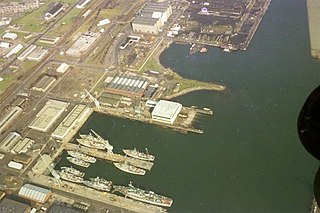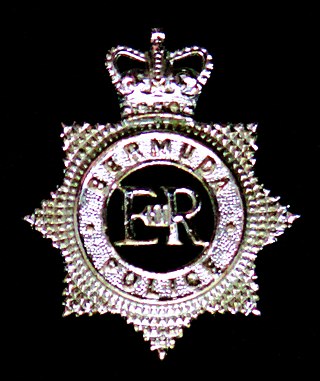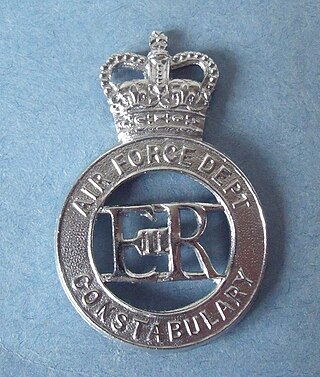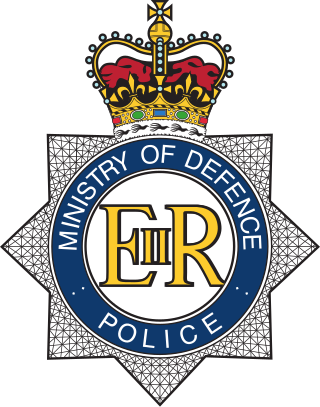Precursors
The constabulary can trace its history back to 1686 when the Royal Navy needed an organisation to prevent dockyard crime. So the Secretary to the Admiralty – Samuel Pepys, the diarist – formed a force of 'porters, rounders, warders and watchmen' to guard the naval yards. Porters identified and escorted visitors, rounders patrolled the yard, warders were responsible for the keys and backed up the porters at the gates, and the part-time watchmen guarded buildings and areas by night. [4]
In 1834 this force became the first dockyard police, with full police powers within the dockyards, and acting as policemen over offences committed by employees and naval personnel within a radius of five miles of the yard. Rewards for obtaining convictions quickly led to corruption, so the force was 'cleaned up' and then abolished. In 1860 dockyard divisions of the Metropolitan Police took over and senior naval officers became magistrates. From 1923 onwards the Metropolitan Police presence began to be replaced by Royal Marines appointed as special constables under the Special Constables Act 1923. No. 3 (Devonport) Division was the last of these six divisions to be pulled out, leaving in 1934, the year which also saw the formal formation of the Royal Marine Police.

The British Armed Forces are the military forces responsible for the defence of the United Kingdom, its Overseas Territories and the Crown Dependencies. They also promote the UK's wider interests, support international peacekeeping efforts and provide humanitarian aid.

The Metropolitan Police Service (MPS), formerly and still commonly referred to as the Metropolitan Police, is the territorial police force responsible for law enforcement and the prevention of crime within the ceremonial county of Greater London. In addition, it is responsible for some specialised matters throughout the United Kingdom, including national counter-terrorism measures and the protection of specific people, such as the monarch and other members of the royal family, members of the government, and other officials.

The First Sea Lord and Chief of the Naval Staff (1SL/CNS) is a statutory position in the British Armed Forces usually held by a four star admiral. As the highest-ranking officer to serve in the Royal Navy, the chief is the principal military advisor on matters pertaining to the navy and a deputy to the Secretary of State for Defence. In a separate capacity, the CNS is a member of the Chiefs of Staff Committee and, thereby, a military advisor to the National Security Council, the prime minister and the monarch. The First Sea Lord is typically the highest-ranking officer on active duty of the Royal Navy unless the Chief of the Defence Staff is a naval officer. Admiral Ben Key was appointed First Sea Lord in November 2021.

The Royal Navy Police (RNP) is the service police branch of the Royal Navy and Royal Marines. Members of the RNP enforce service law and discipline.

His Majesty's Naval Base, Portsmouth is one of three operating bases in the United Kingdom for the Royal Navy. Portsmouth Naval Base is part of the city of Portsmouth; it is located on the eastern shore of Portsmouth Harbour, north of the Solent and the Isle of Wight. For centuries it was officially known as HM Dockyard, Portsmouth: as a Royal Dockyard, Portsmouth functioned primarily as a state-owned facility for building, repairing and maintaining warships; for a time it was the largest industrial site in the world.

Rosyth Dockyard is a large naval dockyard on the Firth of Forth at Rosyth, Fife, Scotland, owned by Babcock Marine, which formerly undertook refitting of Royal Navy surface vessels and submarines. Before its privatisation in the 1990s it was formerly the Royal Naval Dockyard Rosyth. Its primary role now is the dismantling of decommissioned nuclear submarines. It is also the integration site for the Royal Navy's newest aircraft carriers, the Queen Elizabeth class as well as the Type 31 Frigate.

The Bermuda Police Service is the law enforcement agency of the British Overseas Territory and former Imperial fortress of Bermuda. It is responsible for policing the entire archipelago, including incorporated municipalities, and the surrounding waters. It is part of, and entirely funded by, the Government of Bermuda. Like the Royal Bermuda Regiment, it is under the nominal control of the territory's Governor and Commander in Chief, although, for day-to-day purposes, control is delegated to a minister of the local government. It was created in 1879, as Bermuda's first professional police service. In organisation, operation, and dress, it was created and has developed in line with the patterns established by British police services, such as the City of Glasgow Police, and the Metropolitan Police Service.

The Air Force Department Constabulary was a police force in the United Kingdom, responsible for policing the airfields and aerodromes under the control of the Air Ministry, later the Air Force Department.

The Army Department Constabulary was a security police force in the United Kingdom formed as a result of the Special Constables Act 1923. Originally, the Army used serving soldiers to guard its establishments and the only call for police was at places like the Royal Arsenal at Woolwich. A War Department Constabulary was formed in 1925 to replace the Metropolitan Police at the Arsenal.
The Ministry of Defence Police (MDP) in the United Kingdom can trace its origins back to 1686, and has gone through a number of evolutions over the centuries to achieve its present-day form. Until late 1965, the Royal Navy, British Army and Royal Air Force were controlled by separate departments: the Board of Admiralty, the Army Board and the Air Ministry respectively, each had its own Cabinet Minister. In that year it was decided that the three services should be placed under the control of one Minister of State for Defence, and the present Ministry of Defence was formed.

The Ministry of Defence Police (MDP) is a civilian special police force which is part of the United Kingdom's Ministry of Defence. The MDP's primary responsibilities are to provide armed security and counter terrorism services to designated high-risk areas, as well as uniformed policing and limited investigative services to Ministry of Defence property, personnel, and installations throughout the United Kingdom. The MDP are not military police. Service personnel often refer to the MDP by the nickname "MOD plod".

The Royal Marine Police (RMP) was a police force in the United Kingdom formed under the Special Constables Act 1923 which existed from 1934 to 1949.
The 1929 New Year Honours were appointments by King George V to various orders and honours to reward and highlight good works by citizens of the United Kingdom and British Empire. They were announced on 26 February 1929. The announcement of the list was delayed two months by the health of the king, who fell ill with septicaemia in November 1928. There were no recipients of the Royal Victorian Order and only two recipients in the military division of the Order of the British Empire.
The 1932 New Year Honours were appointments by King George V to various orders and honours to reward and highlight good works by citizens of the United Kingdom and British Empire. They were announced on 29 December 1931.

The Civil Lord of the Admiralty formally known as the Office of the Civil Lord of Admiralty also referred to as the Department of the Civil Lord of the Admiralty was a member of the Board of Admiralty who was responsible for managing the Royal Navy's supporting civilian staff, the works and buildings departments and naval lands from 1830 to 1964.

The Department of the Director of Dockyards, also known as the Dockyard Branch and later as the Dockyards and Fleet Maintenance Department, was the British Admiralty department responsible from 1872 to 1964 for civil administration of dockyards, the building of ships, the maintenance and repair of ships at dockyards and factories, and the supervision of all civil dockyard personnel.

The Special Constables Act 1923 was a British act of parliament passed in 1923. It made permanent an earlier act on special constables passed in 1914. Words and sections from the Act were repealed by the Police (Scotland) Act 1956 and the Police Act 1964 and – though it has not been repealed in its entirety – none of its Sections are now in effect.












